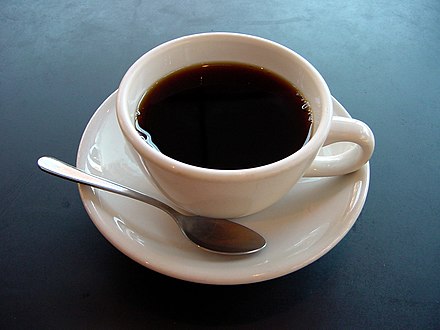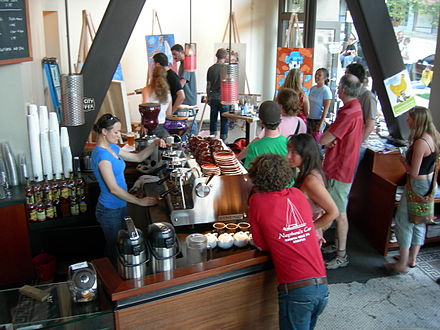Coffee
Coffee
Coffee is one of the world's most popular drinks, with significant cultural variations. It is also the most consumed psychotropic substance (by number of regular or intermittent consumers) in the world and present almost everywhere. Like tea, there are several local variations on this beverage served worldwide.
Understand
Types of coffee

Coffee can be served black (as in no milk added), white (with cream, or milk in straight, 'frothed' or condensed forms) or even sometimes with alcohol (as in a shot of whisky to make 'Irish Coffee'). Many people prefer to add sugar to their coffee to counter the inherent bitter taste.
Types of coffee drink
- Americano: hot water added to espresso
- Cappuccino: espresso with a milk foam, sometimes with spices
- Espresso: a thicker, concentrated form of coffee
- Flat white: espresso mixed with very hot milk
- Latte: short for caffe latte (coffee with milk)
- Mocha: coffee with chocolate and milk
Regional coffee cultures
Coffee is one of the world's most traded commodities, and you can probably find many types in your home region. Nevertheless, there are many distinctive ways of drinking coffee around the world that are worth experiencing.

Africa
- Ethiopia is the botanical home of the coffee plant and some places still offer coffee brewed the traditional way
Americas

- Enjoy the American coffee capitals of Seattle and Portland
- New Orleans has its own unique style of coffee known as café au lait. In contrast to its French namesake, it is flavoured with roasted chicory and uses scalded milk.
- While Nicaragua grows a lot of coffee (in its Northern Highlands), the tradition of drinking coffee is surprisingly weak outside of growing regions and major cities
- Costa Rica used to be dominated politically by the coffee growing class and the beverage is still a favorite of all classes and ethnic groups as well as one of the main agricultural exports.
Asia and Oceania
See also: Western food in Asia#Coffee
- Visit a kissaten in Tokyo
- Have a frog coffee in Vietnam, or otherwise Vietnamese-style filtered coffee is unique too
- It is hard to beat a good 'flat white' in Melbourne, Australia
- Ipoh "white" coffee from Malaysia, roasted with palm oil and served with condensed milk
- Try a Kopi Luwak in Indonesia. Expensive and unusual in that it was prepared by passing through the digestive tract of a civet cat. This can now also be found in most other Southeast Asia nations.
- In Java in Indonesia, the strong black coffees with a base of sugar similar to Turkish, but Javanese in style
- The Philippine provinces of Batangas and Cavite have their own variety of coffee called kapeng barako. This is neither arabica nor robusta, but liberica that grows on a tree rather than a bush.
- South Australia is one of the few places in the world where Coca-Cola isn't the top-selling drink, and the only one where it's not a soda. Instead it's Farmer's Union Iced Coffee, a local band of strong, flavourful iced coffee.
- Hainan has is known in China for its coffee culture because of the influence of returning overseas Hainanese from Southeast Asia.
Europe
- Viennese cafes in Austria
- A strong Turkish coffee in Istanbul, or a very similar Greek (alternative choice is the Frappé, which is instant cold coffee), Armenian or Bosnian coffee
- Take a shot of espresso straight from the machine in Milan, Italy
- Indulge in the Swedish fika culture.
Buy
- Specialist independent coffee shops are considered to provide the best tasting coffee, sometimes roasting beans onsite, grinding the beans before making and taking good care of their machines. Unfortunately it is hard to determine which ones are good. Best to seek online reviews or just ask people living locally!
- High street chains, of which Starbucks is the best known, can provide consistent although not great coffee in most countries around the world
- Fast food restaurants such as McDonalds can also provide a quick coffee fix at a cheaper price than the high street chains. The taste is also not very different.
Coffee plantations
 Coffee grows best under certain conditions, typically in warm climates at high altitudes. The mountains of Jamaica, Colombia, Brazil, Papua New Guinea, Ethiopia and Kenya are ideal. Some countries such as Costa Rica or Nicaragua used to depend or still depend on a good coffee harvest and you may be able to visit farms there as a form of ecological and or volunteer tourism
Coffee grows best under certain conditions, typically in warm climates at high altitudes. The mountains of Jamaica, Colombia, Brazil, Papua New Guinea, Ethiopia and Kenya are ideal. Some countries such as Costa Rica or Nicaragua used to depend or still depend on a good coffee harvest and you may be able to visit farms there as a form of ecological and or volunteer tourism
- Skybury Tropical Coffee Plantation, Skybury Farmgate, 136 Ivicevic Road, Paddy's Green, Mareeba, Queensland, Australia. Tour the coffee bushes in the far Australian north, and sample some freshly produced drinks as well. Australia is actually a tiny producer of coffee worldwide, and most of it comes from this farm.
Coffee visitor attractions
-
Ping Huang Coffee Museum (品皇咖啡博物館), Taibao City, Taiwan.
-
National Coffee Park (Parque Nacional del Café), Montenegro, Colombia. A coffee theme park in the Andean mountains.
Learn
Being a Barista can either be a good way to get a short term job whilst traveling, or a way to develop a long term career.
Stay healthy
 Coffee contains caffeine which is a stimulant. It is therefore not recommended to drink coffee to excess. People with high blood pressure or who suffer from insomnia should take care not to consume too much. Coffee can be addictive.
Coffee contains caffeine which is a stimulant. It is therefore not recommended to drink coffee to excess. People with high blood pressure or who suffer from insomnia should take care not to consume too much. Coffee can be addictive.
In some countries, coffee is widely available in decaffeinated form.
'Old coffee' is not dangerous to drink, but tastes pretty bad. The taste from coffee comes from the oils, and they become rancid over time. Ideally, the coffee should be brewed straight after the beans are ground, and ground coffee should be consumed within a few weeks at the very most.
Decaffeinated coffee or the variety of replacement substances that may or may not taste like coffee while being made from other substances may in some cases be better for your health, especially if you have problems with the heart or blood pressure.
Stay safe
While coffee does contain a psychotropic substance (caffeine) and prolonged exposure does produce (mild) withdrawal symptoms (sleepiness, headaches and other symptoms) its health risks occur when taken in heavy intake amounts, where caffeine toxicity is of concern and a medical issue, but the average coffee drinker would never reach that level.
Even the benefits are low and nothing to worry about for healthy adults. That being said, the bitter taste makes it (theoretically) easier to "spike" than plain water, as many substances that could knock you out have a bitter taste. It is however still very rare and the worst that could happen to you drinking a coffee in most places are bag-snatching, pickpocketing or the (perfectly legal) high prices in some places.
Respect
Coffee is rarely regarded as a vice around the world, although Mormons, Seventh Day Adventists and some Baptists in the United States, as well as the Hare Krishnas, refrain from consuming it due to religious reasons.
Coffee shops often provide a lounge type area where you can sit, read and relax. Although convenient for the traveler, try not to hog your table and seat for hours and hours since other people may also want to sit and the business needs more customers for their livelihood. If you must stay for a long time, then at least purchase more drinks or food now and then.
Some countries, such as the United States, are very accommodating for customizing your coffee with a variety of syrups and milk variants. Baristas in other 'more traditional' countries may find too many requests for a special coffee very annoying. If you really need a 'Grande, Iced, Sugar-Free, Vanilla Latte With Soy Milk' or 'Iced, Half Caff, Ristretto, Venti, 4-Pump, Sugar Free, Cinnamon, Dolce Soy Skinny Latte' then consider visiting a local chain coffee shop, used to such tastes.